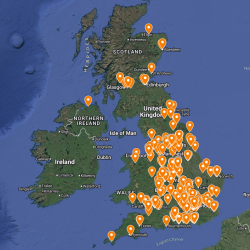
I was on campus a few weeks ago with some friends, offering to share the Gospel and pray with students. One student asked me, ‘So, what’s the goal of this afternoon? What are you trying to achieve?’. I loved the question. It’s one I’ve been asking myself for the last 5 months.
You might be thinking it’s a fairly simple question. Depending on how charismatic you are, you could be aiming for a dramatic encounter with the Spirit; a physical healing or prophetic word. Maybe it’s just to simply share the Gospel with someone. Whatever the process, the 6 steps that typically follow go like this: get them to church, do alpha, make a commitment to Jesus, join a small group, get baptised, and then start doing mission. Why does it need to be more complicated?
"What are you trying to achieve?"
The thing is, that first step can be a big one. Even with a spiritual encounter, it’s not always a guarantee they’ll want anything to do with the church afterward - look at Jesus’ own ministry in Luke 17:11-19! I’m not saying we should get rid of the Spirit in evangelism - we should never do that. But maybe we need to re-examine what the goal of outreach is.
Another way of summing up those steps above is the word discipleship, pursuing a life that follows Jesus and puts him at the centre of everything. The goal is that we want to take people on a journey of discipleship so that they can do the same for others, that’s why we do outreach. How can we start that process from a one-off conversation? We don’t have to get them in church straight away. In fact, you can go a lot further just by talking with them a few times than trying to bring them to a church service.
Imagine this...
You’re out on campus with your small group and you’re chatting with students. How do you even start conversations? At Fusion we love question asking. Jesus asked over 300 questions in the gospels. We even created 2 card decks to help people ask good discipleship questions. Here are a few that might help for outreach:
What do you know about Jesus?
Do you feel near or far from God?
How can I pray for you today?
When people say things like ‘I’m an atheist, I don’t believe in God’ or ‘I think Jesus is just a good guy but I don’t think he did miracles’, it’s so easy to think that is the end of the conversation. An important lesson we have learned is not to assume that what we understand by the word atheist, for example, is what the person we are talking to means. Here are a few great questions that will keep the conversation going and hopefully open it up more!
How did you come to that conclusion?
What reasons do you have for thinking that?
Tell me more about that...
What do you mean by that?
Your role is to learn and understand as much about that person and where they are coming from so that when you have the opportunity to share you can do so in a way that meets them where they are at and answers the questions they are actually asking.
Then, if you think they are open and want to go further, you ask the big question; would you be up for meeting again with me and a friend (hopefully your friend has been with you during this conversation!)? "You seem really interested and I’d love to chat more about Jesus with you, would you want to go for a coffee with us and talk more?" Then you lock in a time and place.
For the last 5 months, I’ve been going out on campus with a team every Thursday afternoon to reach students. We’ve started using these questions too which has been really helpful. We’ve been able to have better conversations with students and we’re starting to book walks, coffees and chats with students to talk about faith! It’s very early stages and we know we can’t do anything without Jesus, but it’s exciting to see how mission can connect to discipleship.
There isn’t a formula to mission unfortunately, this strategy won’t guarantee every conversation you have will lead to salvation. But, it might help someone who is interested in finding out more about Jesus take one small step towards faith.






